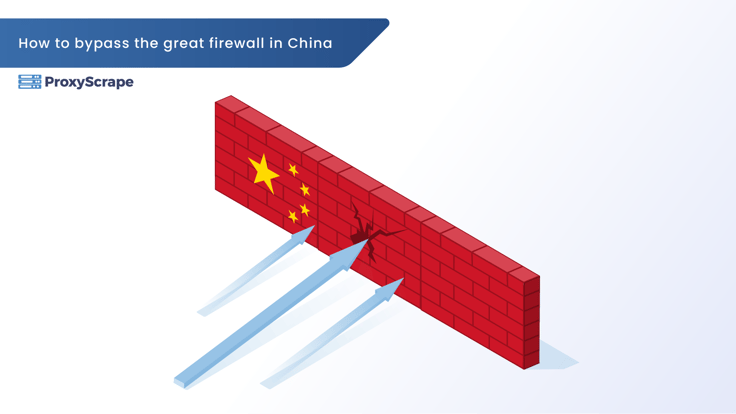How to Bypass the Great Firewall in China

Whether you intend to travel to China or not for a brief stay or whether you’re a Chinese citizen or not, it is imperative to know how China censors its citizens’ internet usage. The Great Firewall of China plays a massive role in restricting internet content for Chinese citizens. This article will cover the Great
Whether you intend to travel to China or not for a brief stay or whether you’re a Chinese citizen or not, it is imperative to know how China censors its citizens’ internet usage. The Great Firewall of China plays a massive role in restricting internet content for Chinese citizens. This article will cover the Great Firewall of China in detail and various techniques with which you could bypass it.
First of all, let’s analyze the situation in China with regard to content restriction.
What is the great firewall of China?
The government of China restricts its 800 million population’s internet access to giant global websites such as Facebook, Google, Twitter, Instagram, Snapchat, Yahoo, Slack, and YouTube.The Chinese government is able to block such a massive ocean of content through the world’s most extensive system of censorship known as the Great Firewall of China. This restriction applies to mainland China and recently to Hong Kong as well.
Why was the great firewall created?
In the 1980s, when the Chinese economy was booming, its leaders feared the more significant impact from the outside world on its economy. This was evident from the fact when one of its past leaders, Deng Xioping said, “If you open the window for fresh air, you have to expect some flies to blow in.”
So the internet made its debut in China in 1994 due to a byproduct of a support tool for a “socialist market economy.” From then onwards, the availability of the internet gradually escalated, becoming a tool for communicating trade information.
By the end of the 90s, the Chinese government initiated the Golden Shield Project. It was a culmination of a series of projects relevant to surveillance and security, which included the Great Firewall of China.

The main objectives of this censorship are:
- First, censorship allows the government to regulate the flow of information entering the nation to some extent. The Chinese internet follows the party line, supports the official narrative, and silences those who oppose such views.
- Second, the GFW (Greater Firewall) has cultivated an economy that favors Chinese firms locally. With the government outlawing or heavily regulating foreign tech giants, Chinese firms may thrive in their place, frequently utilizing and optimizing their approach for the Chinese market.
- So some of the Chinese products that emerged as a result of this censorship include Chinese Facebook(WeChat), Chinese Google(Baidu), Chinese Twitter (Weibo), Chinese Uber (Didi), and some others.
How does the Great Fire Wall of China work?
As mentioned above, GFW is a vast, sophisticated system as Chinese authorities have used a sea of complicated methods to censor its citizens’ internet usage. However, from a users’ point of view, it operates straightforwardly.
For instance, if you type the URL of Facebook in your web browser, it will appear to you as the site is loading. But it never does nor provides any message that the site is blocked. When this happens, indeed, it is a result of GFW blocking you from accessing Facebook. As a consequence, the user would give up and search for an alternate option.

Primary techniques employed by Great Firewall of China
IP address blocking: In IP address blocking, the GFW blocks all the IP addresses from mainland China connecting to restricted web servers of websites mentioned above.
URL filtering: In URL filtering, web administrators of GFW block filtered URLs on the local network of mainland China if the URL entered by the user is on the filtered URL list in the local database. Furthermore, this technique involves filtering sensitive keywords that are deemed inappropriate in the Chinese context. One of the prominent examples of keyword filtering is; suppose if you type “Tiananmen” in search engines in China, the GFW will block the user from accessing websites relevant to the term.
DNS spoofing or DNS poisoning: When you access a website, your device will establish a connection with the DNS server requesting the IP address of that website. With GFW, when DNS returns the response, it returns an incorrect or a corrupt address.
Manual and AI Censoring: The state employs hundreds to thousands of civilian workers to monitor and censor any online content deemed harmful to China’s progress. They would also report to the authorities any breach in content. After that, the authorities make on-site investigations. Some of the sites also have back-end functionalities to censor content directly. Lately, though, with the introduction of AI(Artificial Intelligence) this censoring process is automated.
Self-censorship: Many companies in China fear that going against the rules imposed by their government would lead to severe fines for shutting them down. Therefore the companies not only act according to the rules and regulations but also set up enforcement teams to monitor that their websites do not contain any prohibited materials.
VPN blocking: As VPNs mask your actual IP address, they are one of the most common ways to circumvent the GFW. However, the Chinese authorities are aware of this and hence have started cracking down on VPNs recently. On the other hand, some active VPNs are still operating in China to work against the GFW.
Methods to escape the great firewall
How does the great firewall affect Chinese citizens and visitors?
You now understand what GFW is and how it works. So, suppose you’re visiting China for a short time. In that case, you’ll need to know how to get around the GFW since life would be boring without you accessing social media, or perhaps you have an official online business meeting outside of China in Google Meet. So before you step foot in China, you may need to find an alternative.
However, what about the current population in China, which includes both Chinese nationals and foreigners?
Such consequences, however, are outside the scope of this article. But, to give you a quick overview, let’s examine a few instances.
You can classify the Chinese nationals into two groups concerning GFW:
- Those who create content online for services: For this category, blocking social media or other websites is not a significant concern as there are ample alternatives locally. For instance, if someone wants to create a Youtube channel about cooking their favorite Chinese cuisine, they could achieve the same outcome with Youku.com. However, if anyone wishes to do podcasting at the highest quality, a lack of affordable audio hosting could have drawbacks.
- Those who don’t create content, including engineers and software developers: For this group absence of certain services like Google searches would lead to a lack of productivity due to being not able to acquire information instantly. Because of this reason, plenty of talented individuals have also left the country.
As a result, both groups of individuals suffer because of the GFW. Therefore, getting around the GFW is critical, and we’ll look at a few alternatives in the following section.
Use a VPN
So far, VPN is the most popular mechanism to bypass the GFW. However, on the downside, they are more expensive, and as stated earlier Chinese authorities have started cracking them down lately. However, the role of VPNs is beyond the scope of this article. You can find out more about VPNs for China here.
In contrast, proxies are cheaper and flexible, which we’ll explore next. You may further find the difference between proxies and VPNs and which is best for you here.
Proxies
If you read some of the previous articles in our blog by now, you should understand what a proxy server does. In a nutshell, a proxy server masks your IP address and location to hide your real identity to the website that you”ll be connecting to. As a result, there is no direct connection between your device and the website unless the website is hosted on your device.

So When selecting a proxy to bypass the Great Firewall of China, you need to factor in the following:
Location and Latency
When we refer to location, we mean the physical location of the proxy server. Suppose you choose a proxy server in Germany to access Facebook it would appear to the Facebook server as your traffic arriving from Germany.
With the GFW, there comes another vital concept of latency.
Under the normal circumstances sans the GFW, latency would be pretty minimal. Furthermore, in normal circumstances, the latency will be pretty negligible if you use a proxy in the USA to access Facebook rather than elsewhere as Facebook is hosted in the USA.
When you connect to a proxy server while using GFW, it adds an extra step, increasing the latency. As a result, while choosing a proxy location, you must pick one that’s close to the webserver you’re connected to.
Though latency is an issue when utilizing proxies with GFW, you should be grateful that the page is loading faster than loading nothing at all. Next, we will dive into the choice of public proxies and private proxies.
Public proxies
People tend to share freely available or public proxy IPs, which may lead to several issues. Firstly, if any other user sharing the same proxy IP indulges in a malicious act, that particular IP would be banned. Then when you try to access the destination website, you will not be able to use that already banned proxy server.
Secondly, they strap your content with ads or include an iframe filled with ads. In both scenarios, they intend to rip some money off your browsing.
Furthermore, you would”ll find public proxies in undesirable regions of the world. As a result, you may fall prey to websites that filter IP addresses.
Also, they’re really inefficient, as the hardware they support is mediocre.
Paid Private Proxies
Although most premium private proxies do not have these obstacles, the majority of users prefer free services. Private proxies receive less traffic as a result of this. Above all, they tend to eliminate the nefarious features that lead to proxy server bans in the first place.
In contrast to public proxies, sophisticated hardware supports private proxies and you can locate them in many favorable locations globally. Unlike public proxies, private proxies do not pose many security risks.
So when deciding which one to use over the other, if you are browsing the web merely to find the latest news and sports updates, the public proxy would do. However, private proxies would be your first choice for online payments and for websites where you need login credentials.
Rotate proxies
So now you’re aware that private proxies, along with an appropriate location, are ideal for bypassing the GFW. What you now need to do is to select a pool of residential proxies and rotate them. This is because if GFW bans one of your connections, you can use the other proxy and so forth.
Since you have to consider the latency and the location, make sure to select and rotate proxies from unfiltered locations. For instance, if you choose a proxy server from the Middle East or Eastern Europe, the delay will be greater. This is because these proxies also involve filtering your traffic. So we recommend selecting your proxy server from the least unfiltered location, such as the UK or the US. In comparison to swapping VPNs, the rotation of proxies is a lot quicker.
Please visit our residential proxy page for more information.
Smart DNS
Another tool you may want to keep in your possession, along with proxies, is the Smart DNS. It wouldn’t make any sense to use a US proxy to browse a Chinese website when you’re in mainland China. It’s likely to be filtered from outside, although it is accessible within the mainland LAN network. This could be problematic when China is not just trying to curb one-way traffic.
So you can use Smart DNS to remove location data from connections instead of turning your proxy on and off. Then you’ll appear to be in China for local sites and outside of China for international sites.
Conclusion
Now you have learned about GFW and how to bypass it. When you attempt to access blocked websites within China, Proxies are cheaper, safer, and a flexible approach. However, proxies are also not perfect, as sometimes they would get blocks as well. But you can constantly rotate the proxies if one fails.
Also, we would like to stress that you refrain from doing anything illegal when bypassing the firewall. Keep in mind to respect the laws of the land.